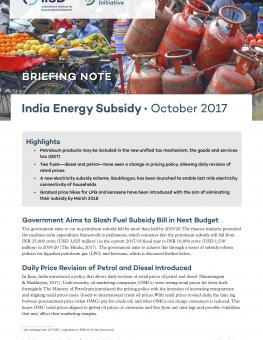
India Energy Subsidy Briefing October 2017
The India Energy Subsidy Briefing covers issues related to energy subsidies. October's edition included topics of petroleum products, a discussion of pricing policy for diesel and petrol, a new electricity subsidy scheme, and price hikes for liquefied petroleum gas and kerosene.
As part of its work on energy policy and sustainable development in India, the Global Subsidies Initiative publishes a regular briefing on issues related to energy subsidies.
Below are highlights from the October 2017 edition:
- Petroleum products may be included in the new unified tax mechanism, the goods and services tax
- Two fuels—diesel and petrol—have seen a change in pricing policy, allowing daily revision of retail prices
- A new electricity subsidy scheme, Saubhagya, has been launched to enable last mile electricity connectivity of households
- Gradual price hikes for liquefied petroleum gas and kerosene have been introduced with the aim of eliminating their subsidy by March 2018
For any additional or more detailed information, please do not hesitate to contact Christopher Beaton or Shruti Sharma.
Participating experts
You might also be interested in
Increased Support Needed to Achieve India's Clean Energy Goals
India is on track to achieve many of its 2030 clean energy goals but needs to step up government support measures to accelerate the deployment of offshore wind, electric vehicles, and green hydrogen, according to a new report.
India Faces Clean Energy Challenges as Energy Demand Soars and Global Fossil Fuel Subsidies Rise
New research finds the global energy crisis and increasing energy demand have pushed India's energy subsidies to a 9-year high.
G20 energy ministers call for cooperation on nuclear energy & low-emission hydrogen
The Group of 20 energy ministers' meeting concluded in Goa on July 22, 2023, with the final summary failing to include language on the phase-down of unabated fossil fuels.
Implementing Solar Irrigation Sustainably
This guidebook provides recommendations to state policy-makers on how they can implement solar irrigation models, particularly decentralized solar plants for irrigation under the PM-KUSUM scheme, effectively and sustainably.